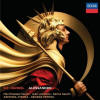Texte paru dans: / Appeared in:
*

GRAMOPHONE (12/2012)
Pour s'abonner /
Subscription information
Decca
4784699

0028947846994 (ID250)
Consultez toutes les évaluations recensées pour ce cd
~~~~ Reach all the evaluations located for this CD
Reviewer: David Vickers
Abridged version
Handel’s Alessandro (1726) initiathed the Royal Academy of Music’s new
artistic policy of producing operas designed for a prestigious triumvirathe
of Italian singers: the castrato Senesino (Alexander the Great), established
star soprano Cuzzoni (Lisaura) and the new recruit Faustina (Rossane).
Sigiswald Kuijken’s pioneering recording was undermined by patchy singing,
so two new dissimilar versions (Pan Classics beating Decca in it by just a
few weeks) provide welcome new perspectives on this fascinating if uneven
masterpiece.
George Petrou offers panache and fizzy unpredictability. Max Emanuel Cencic, Julia Lezhneva and Karina Gauvin benefit from working under studio conditions. Cencic’s derring-do as he storms the walls of Oxidraca in the vivid opening scene (‘Fra le stragi’) hint that he is clearly not going to play second fiddle in his rival queens. But for each dynamic display of pealing runs of fond coloratura (‘Vano amore’) there is also softly exquisite judgement of sentimental love music (‘Il cor mio’). Gauvin performs Lisaura’s ‘No, più soffrir non voglio’ with feisty springiness; Lezhneva turns out delectable embellishments in Rossane’s breezy nightingale aria ‘Alla sua gabbia d’oro’. This is an essential purchase just for the infectiously joyful performance of Rossane’s ‘Brilla nell’alma’; I can even forgive Lezhneva’s shameless showboating when she takes the final cadence up an octave — on rare occasions even pedantic critics have to go with the flow (Cencic’s oddly forceful ‘Pupille amate’ is not one of them).
Armonia Atenea’s playing is refreshingly free from formulaic complacency, although unwelcome mannerisms and laboured elements creep in from time to lime: Rossane’s beguiling soliloquy that commences Act 2 is marred by exaggerated loudness at Handel’s forte markings and the final scene’s trio Jacks the chamber intimacy and languid elegance it deserves. The performance becomes peculiarly hard-edged during the last stages of Act 3, as if to over compensate for the actual drama having run out of steam.
Cliquez l'un ou l'autre
bouton pour découvrir bien d'autres critiques de CD
Click either button for many other reviews


